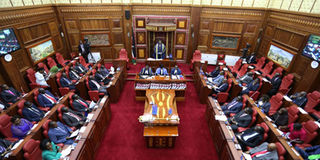Perhaps we should consider a diminished National Assembly

The Senate in session on February 4, 2014. Broadly, it can be argued, the Senate best understands the agenda of the county. Photo/FILE
What you need to know:
- Arguably the National Assembly, as crafted in the Constitution is of less benefit to Kenyans.
- County governments are actually best placed to identify, discuss, legislate and implement developments in order of priority across the County.
Between the National Assembly and the Senate, the former appears set to bear less significance in the devolved system of governance in Kenya.
Of course, in terms of the way the Constitution is constructed, the National Assembly has powers originating from its functions that tend to place it above the Senate. Discussing concerns on national security, for instance, is more a function of the National Assembly than the Senate. Further, the institution has a wider leeway to discuss and legislate on a number of bills compared to the narrow path the Senate has to fix itself into.
Notwithstanding the bad light that the current National Assembly has earned, and in spite of some extremely brilliant MPs putting in performances worth their value, arguably the National Assembly, as crafted in the Constitution is of less benefit to Kenyans.
First, the devolved system has been tested for the past year. We can clearly state, in teleological terms, that a female calf can only grow into a cow. A puppy perfects itself into a dog. A coffee seedling will actualize itself in becoming a coffee tree, and so forth.
WEAK LINKS
The devolution we are implementing and therefore experiencing in Kenya, does not have the National Assembly as one of its inherent mainstays. Indeed, the National Assembly was intended to be one of the central pillars of sustaining the devolved system, but upon maturing, there is no feasible way the system will perfect itself with the institution as part of its essence.
Instead, there is a very weak link between the County governments and the National Assembly. The natural evolution emerging from our devolution process shows a strong link between County governments, the Senate and Executive. The National Assembly is, on the other hand, evolving as a kind of hip offshoot that is irritatingly present.
Second, there is a multiplicity of representational roles. Members of Country Assemblies (MCAs) are not even the smallest unit of elected leadership in the country. Clan elders are, to a large extent, elected and have considerable influence at their level in some quotas. Nevertheless, assuming that MCAs do indeed represent the lowest legislative level, most constituencies have at least two of these.
Further, a governor administers a county as the legitimate CEO but also would represent the County at a national level in the governors' caucus. A governor is therefore a representative of a county.
The governor traverses Constituencies in order to, hopefully, promote development. In this sense, governors are closely in touch with their county residents.
In addition to the governor, a senator promotes but also protects the interests of respective counties at the national level.
Broadly, it can be argued, the Senate best understands the agenda of the County. In the Senate, concrete issues affecting county residents across the country are debated and given prominence.
LITTLE ADDED VALUE
Third, County governments are actually best placed to identify, discuss, legislate and implement developments in order of priority across the County. Funds from the National Government, such as CDF and all those due to County governments are best put to use through a prioritizing local institution, which in this case, is the County government.
The fact that these governments have a legal mandate to pass bills and ensure their implementation is a factor that needs positive interpretation.
It is therefore difficult to see the added value of a MP whose constituents are well represented both at county and national levels.
Fourthly, most of the duties that have been assigned to National Assembly can be devolved. Bills of national importance should be discussed at the county level, then proposed to the Caucus of Governors, that if empowered can sieve and pass them to the Senate for final consideration.
What this process amounts to is a stronger actualization of public participation in national discourse as demanded for in the Constitution. Besides cutting down on huge national wage bill that is difficult to justify, doing away with National Assembly will strengthen the 47 County governments as central institutions on which development starts but also is realized.
Thus, critically speaking, Kenya’s devolved system of governance has rendered the National Assembly less necessary and county governments more relevant. The executive should learn to work with governors who are much closer to the people, and whom, county residents can recall if and when needed.
Conclusively, a continued existence of the National Assembly in the current system is likely to recreate presidentialism, a system that enabled county governments will naturally erase.
Dr Mokua is the Executive Director, Jesuit Hakimani Centre





